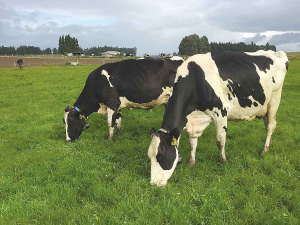Government approves nationwide recycling scheme for primary sector plastics
Rural recycling scheme Agrecovery is welcoming the Government's approval of regulations for a nationwide rural recycling scheme for agrichemicals and farm plastics.
 The initial pilot project is set to recycle 10,000 cow collars that have reached the end of their battery life this year.
The initial pilot project is set to recycle 10,000 cow collars that have reached the end of their battery life this year.
MSD Animal Health New Zealand has partnered with Agrecovery in New Zealand’s first pilot to recycle SenseHub Dairy Collars (previously known as Allflex Collars) used by its dairy farmer clients.
The initial pilot project is set to recycle 10,000 cow collars that have reached the end of their battery life this year and will provide a template for recycling all types of e-waste off farms as digital, data driven farming becomes common place.
Cow collars are increasingly used by New Zealand farmers to help manage animal wellbeing, track productivity and control animals on farm. About 17 percent of the national milking herd now wear collars.
Pauline Calvert, MSD New Zealand livestock business unit lead, says waste minimisation and supporting sustainability efforts is a priority for MSD Animal Health.
“MSD Animal Health has been working with Agrecovery since 2006 to recycle some of its animal health products’ packaging. Recycling cow collars is a natural progression for us as an industry leader to implement solutions for on-farm electronic materials. It’s core to our business and we want to help our customers also meet their sustainability goals so that collectively we are making a difference.”
Agrecovery chief executive Tony Wilson says farmers have an increasing amount of electric componentry on-farm. This can range from collars to cell phones, EID readers, sensors in their yards and milking sheds, batteries and tracking devices. Electronic waste will continue to increase as farming moves to more digital based, data driven operations.
“All these components have metal, plastic, and a circuit board inside them. What MSD Animal Health is doing with this pilot with Agrecovery is directly transferrable to all those other products,” says Wilson.
Agrecovery has developed a process which takes about five minutes to deconstruct each SenseHub Dairy collar, separating the buckle, steel weight, various plastics, and electronics.
The electronics also have their plastic covers removed for separate recycling. The componentry is then sent to the relevant recyclers where it can be recycled and used in new products.
Working through Agrecovery, collars will be collected at a North Island and South Island site, with MSD Animal Health collecting the collars from their customers as they come up for renewal. The scheme also means farmers can demonstrate they can meet their milk processes environmental initiatives such as Fonterra’s Co-operative Difference scheme, which pays farmers a premium for achieving targets around milk quality, sustainability, animal welfare, and health and safety.
“Through our collaboration with Agrecovery we will know which farm the collars have come from, and how many collars they have recycled,” says Calvert. “Our dairy farmer customers can then use this information to meet their own sustainability goals and continue to make a real difference to our future.”
The Government has a compulsory stewardship programme for animal health products that comes into effect from September this year under the Waste Minimisation Act, and Agrecovery is an accredited provider; however, there is not a compulsory scheme for e-waste, yet.
Keratin biomaterials company Keraplast and Wools of New Zealand have signed a new superpremium wool contract which is said to deliver a boost to wool growers.
While things are looking positive for the red meat sector in 2026, volatility in global trade remains a concern, says the Meat Industry Association (MIA).
The quest to find innovative practical, scientific solutions to deal with water-related issues at a catchment level has been the theme of an important conference at Massey University last week.
One of the country's top Māori farms faces a long and costly rebuild to get the property back to where it was before recent storms ripped through it.
The latest Global Dairy Trade auction results have delivered a boost to dairy farmers.
New Zealand potato growers are prioritising value creation from high yields to meet a complex mix of challenges and opportunities, says Potatoes NZ chief executive Kate Trufitt.
OPINION: Fonterra may be on the verge of selling its consumer business in New Zealand, but the co-operative is not…
OPINION: What does the birth rate in China have to do with stock trading? Just ask a2 Milk Company.